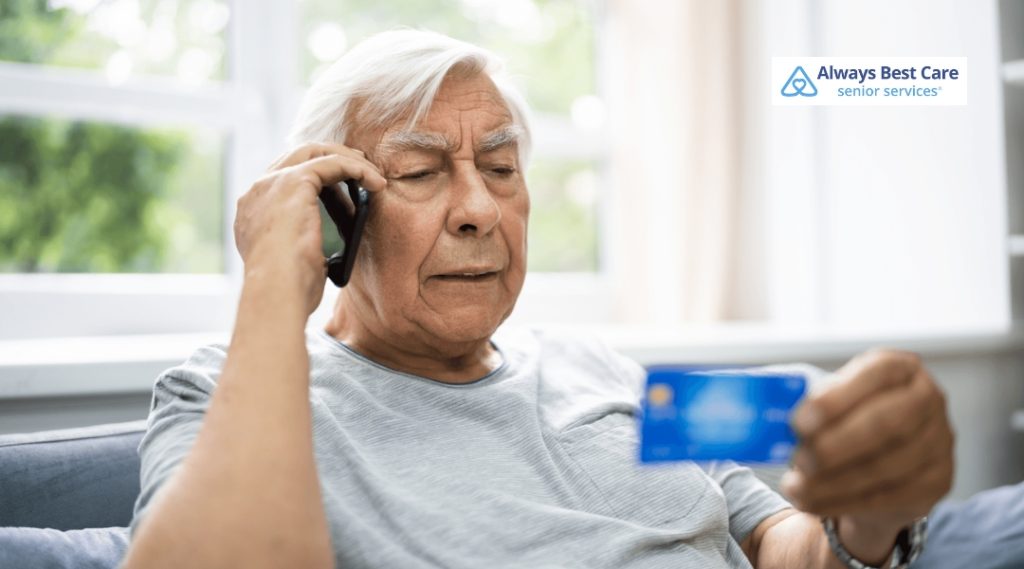Stay Safe: How Seniors Can Spot and Avoid Scams in West Monroe, LA

In the heart of West Monroe, LA, the senior community often becomes the target of deceptive scams designed to exploit their trust and hard-earned savings.
Our Always Best Care team aims to equip West Monroe’s seniors with the knowledge and tools to recognize and avoid scams, ensuring their safety and peace of mind in our community.
Table of Contents
6 Top Scams Seniors in West Monroe Should Know About
Phone Call Deceptions: Impersonators and Emergency Pleas
One of the most alarming tactics involves scammers calling and pretending to be a grandchild, niece, or other loved one in urgent trouble—often claiming to be in jail, hospitalized, or stranded. They may beg the senior not to tell anyone and immediately wire money.
Other times, scammers impersonate law enforcement, government agencies like the IRS, or utility companies, demanding payment under the threat of fines, arrest, or service disconnection.

Medicare & Health Plan Fraud Targeting Older Adults
Scammers know that most people over 65 are enrolled in Medicare, and they use this to their advantage. They may offer “free” medical equipment, testing kits, or services, asking for Medicare numbers and other personal details.
In other cases, fraudsters pose as Medicare representatives to gain access to benefits or bill for services never provided.
Fake Tech Support Warnings and Virus Scares
These scams usually begin with a pop-up warning on a computer or a cold call claiming the device is infected with a virus. The scammer offers to “fix” the issue—for a fee—by gaining remote access to the victim’s computer.
Once inside, they can steal passwords, install malware, or demand more money to “release” control of the device.

Prize and Lottery Scams That Ask for Money First
Who wouldn’t be excited to win a big prize? Scammers exploit that thrill by claiming you’ve won a lottery, sweepstakes, or a free vacation—then request payment for taxes, processing fees, or delivery costs. Of course, there’s no real prize, and the scammers disappear once they get your money.
Online Romance Scams That Exploit Emotions
Romance scams often begin on social media or dating sites. Scammers build trust over time, sometimes chatting for weeks or months before introducing a financial emergency—a sick relative, a failed business, or the need for a plane ticket. They manipulate emotions to ask for money and then vanish once they receive it.
Charity Scams Preying on Goodwill and Crisis Situations
Scammers often appear after natural disasters, health crises, or high-profile tragedies, pretending to represent legitimate charities. They may pressure seniors to donate quickly via phone, email, or door-to-door visits.

4 Key Warning Signs of a Potential Scam
High-Pressure Tactics and Urgent Payment Demands
Scammers often create a false sense of urgency to push victims into quick decisions without time to think. They may claim that immediate payment is needed to avoid arrest, to release a loved one from jail, or to prevent a service from being shut off. The goal is to overwhelm and frighten the target into compliance. Legitimate organizations will not pressure you into fast payments or use scare tactics.
Odd Payment Methods Like Gift Cards or Crypto
A telltale sign of a scam is being asked to pay using nontraditional methods, such as gift cards, cryptocurrency, wire transfers, or prepaid debit cards. Scammers favor these options because they are difficult to trace and nearly impossible to recover once sent. No reputable business or government agency will request payment this way.
Suspicious Emails and Texts With Typos or Bad Links
Fraudulent emails and text messages often contain poor grammar, misspellings, or awkward language. They may also include links that look strange or don’t match the supposed sender’s website. Clicking on these links can lead to phishing sites that steal your information or infect your device with malware. If a message seems off, it probably is.
Pretending to Represent Government or Healthcare Agencies
Scammers frequently impersonate officials from agencies like the IRS, Medicare, or Social Security to gain trust and authority. They may use spoofed phone numbers and official-sounding language to appear legitimate. These agencies will never call or email you out of the blue asking for sensitive information or payment. Always verify the identity of the caller or sender through official contact methods.

Safety Habits for Seniors
Staying safe from scams starts with building simple, smart habits into your everyday routine. These practices can help seniors in West Monroe stay protected, informed, and confident when faced with suspicious situations.
Double-check before you respond or send money. If you receive a phone call, message, or email asking for money or personal information, take a moment to verify the source. Call a trusted family member, check with your bank, or contact the organization using an official number. A second opinion can prevent a costly mistake.
Keep personal details private, even online. Never share your Social Security number, Medicare information, bank details, or passwords unless you are sure who you’re dealing with. Avoid posting your birthday, address, or travel plans on social media, as scammers can use this information to target you.
Be cautious with offers that sound too good. Scammers often promise big prizes, guaranteed returns, or once-in-a-lifetime deals to lure people in. If it seems too good to be true, it usually is. Research the offer and consult someone you trust before making any decisions.
Watch your accounts for any unfamiliar activity. Regularly review your bank statements, credit card bills, and Medicare summary notices. If you spot a charge or transaction you don’t recognize, report it immediately. Early detection can help limit any damage.
Caregivers Help Safeguard Seniors From Scams in West Monroe
In-home care plays a vital role in helping seniors stay safe. They assist with daily tasks and serve as trusted allies in the fight against scams. Their regular presence and close relationship with older adults give them unique opportunities to notice potential warning signs and provide timely support.
Caregivers can help identify suspicious activity early. They might notice unusual phone calls, sudden changes in behavior, or unfamiliar packages or mail. By being alert and observant, caregivers can step in and ask questions or alert family members before any harm is done.
They also serve as an extra layer of protection regarding communication. Caregivers can screen phone calls, help seniors understand strange messages or emails, and encourage them to pause and verify before sharing personal information or sending money.
In-home caregivers can provide valuable education. Many are trained to recognize common scam tactics and can talk openly with seniors about how to avoid them. This guidance builds confidence and reinforces safer habits.
Most importantly, caregivers offer companionship and emotional support, which can reduce the loneliness and isolation that scammers often exploit. Having someone to talk to regularly makes it less likely that a senior will fall for a scam fueled by fear, urgency, or the promise of love and attention.
At Always Best Care of West Monroe, we are dedicated to ensuring the safety and well-being of seniors. Contact Always Best Care of West Monroe at (318) 322-2223 to learn more and schedule your free consultation. Stay informed, stay alert, and stay safe.





